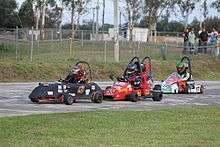Electrathon

An electrathon is a competition to go the farthest in one hour powered only by commercial rechargeables batteries weighing no more than 73 pounds (33 kg) (two car batteries). The record is 62.05 miles (99.86 km) as of February 2011.[1]
It involves three- or four-wheeled electric vehicles, somewhat similar in overall appearance to a Go-Kart with an aerodynamic body, but powered by an electric motor and batteries. Electrathon class vehicles are principally defined and constrained by length and width (12 feet long and 4 feet wide or 3.6 m × 1.2 m maximum) and by battery weight and chemistry (73 pounds or 33 kilograms, sealed lead acid). Discharged for one hour, this amounts to just under one kilowatt (1.3 hp). Driver's weight is ballasted to 180 lb (82 kg) for fairness, and the vehicles themselves may weigh from 80 to 150 pounds (36 to 68 kg). Safety regulations require features such as braking systems, roll bars, and electrical disconnects.
Electrathon racing started in England, spread to Australia, and arrived in the United States in the 1980s. The basic format is to determine which car can travel the furthest in one hour within the limitations of battery weight and other factors mentioned above. The main design problem is posed by the fact that high speeds drain the batteries rapidly resulting in the car's not being able to continue in motion for the entire hour, so design teams must compromise speed in order to gain distance. The main desideratum is efficiency of both the machine and driving technique.
The relatively low cost of the electrathon racing has made the sport a popular activity for high school age students worldwide who learn skills related to design, problem-solving, teamwork, mathematics, physics, and electricity. Prizes are awarded for high school, college and open divisions, and there are separate classes for solar and advanced battery vehicles, but all generally race together under the same rules.
Races are held on parking lots, road courses, and oval speedways, but size is a major factor, as cornering friction decreases efficiency. At present, the world record for distance travelled in one hour is 62.05 miles (99.86 km), set in July 2009 on the 5-mile (8.0 km) oval at the Ford Michigan Proving Ground, by C. Michael Lewis.[2] Using the USDOE conversion factors, this would be the equivalent of 2,370 miles per US gallon (1,010 km/l).
Land Speed Record
In 2007, the Utah Salt Flats Racing Association added an Electrathon class, with the same basic rules, but competing for straight line top speed in one mile (1.6 km).[3] The current record is 110.258 mph (177.443 km/h) by Cloud Electric in 2008.[4]
Changes
Before the 2010 season, the Electrathon America battery weight limit was 67 pounds (30 kg).[5]
See also
References
- ↑ "Electrathon America". Retrieved 2011-02-24.
- ↑ "Mainer sets new world record in battery electric car". Retrieved 2011-02-24.
- ↑ "U.S.F.R.A. Bonneville Electrics Rules". Retrieved 2011-02-26.
- ↑ "World of Speed--Sept 18, 2008". Retrieved 2011-02-26.
- ↑ "EA to Vote on Electrathon Battery Rule Change". Retrieved 2011-02-26.
External links
- http://www.electrathonamerica.org/ - Electrathon America
- http://www.econogics.com/ev/electhon.htm - Electrathon Information
- http://www.electraton.com.mx/ - Electrathon Mexico
- http://www.uni.edu/ceee/electrathon/ - Electrathon Iowa
- Go-Kart conversion.
- http://www.nyelectrathon.com/ - New York Electrathon